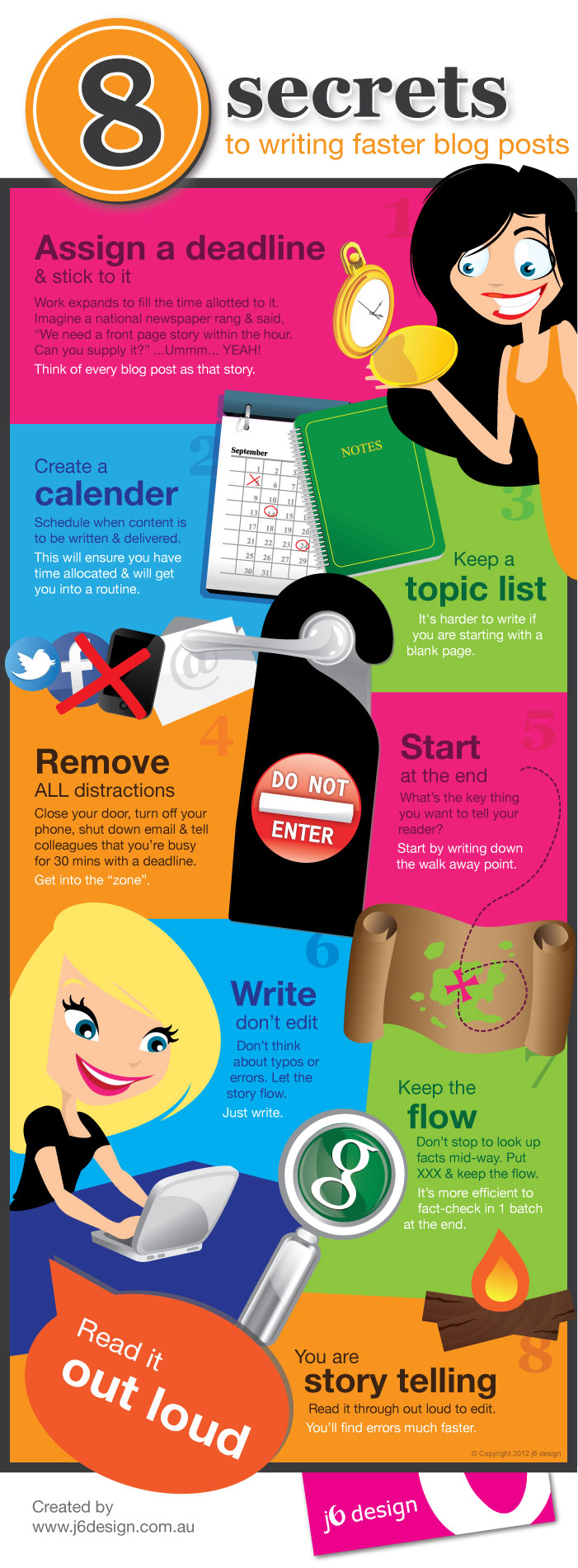Increase Your Productivity: How to Write Faster

Those who like to write a lot might have already asked themselves the question whether by any means they could have written more posts in the same amount of time. This question, driven by the desire to increase one's productivity, is not just interesting, but quite important to people that have to write a lot in their job. For freelance journalists, it is even a determining factor of their honorarium. The more they can produce in a given amount of time, the more money they will earn - implying a fitting commission situation. In this article, I will give you some advice that originates from daily practice and might help you to spend less time per written article.
 Image Source: 8 Secrets to Writing Faster Blog Posts
Image Source: 8 Secrets to Writing Faster Blog Posts
A Few Words at the Beginning
Some of the following productivity tips might sound a little profane, and you might doubt if they can help. However, I assure you that every single one of these tips stems directly from practice and can help you to write faster as well. Often the most obvious things are overlooked too quickly.0. Write Down all Article Ideas
In a lot of cases, you forget great ideas for articles because you didn't note them immediately. Not only if this rings true to you, should you create an idea book that you keep with you at all times. When sitting down to write an article, you will instantly have a great idea to prepare for and elaborate on.1. Prepare Yourself Well
Before starting to write, collect all the significant sources for your planned article. Think about the structure of the post for a couple minutes. Also consider possibly needed image material, download it and store it on your desktop for later use.2. Set a (Daily) Deadline
When you set a time limit for yourself, you will automatically be done faster as you have a temporal aim. You know when you need to be done, and thus, you will hurry up more than you would without said time limit. You surely heard about that law that states that any task will always take up the entire time slot there is for getting it done. Narrow down the time slice and you'll see that it works.3. Start with the Second Paragraph
The first paragraph of a blog post is always crucial. It is the lead paragraph and used to describe the topic of the article. This is why many people take a lot of time trying to write a good first paragraph. Start with the second paragraph and write the first one at the end so you are still in the "flow" which allows you to complete the text faster.4. Productivity Enforcer: Write Against the Clock
This works great for me. I use a timer or countdown app while writing. Before starting, I think of a period of time in which the respective article has to be finished, then begin the countdown. After the set time has passed, the app emits a loud sound. I am still working on getting things done before the sound reaches my ears. But I have already improved, so try it for yourself. Timer App for Windows | Timer App for Mac OS X5. Find Your Most Productive Hours
Not every human can be on the same level of creativity and pace at any time. Some people - among them an impressive amount of top managers - are the most productive in the early morning. Get up early when it's easy for you to write in the morning. When you're getting fit in the evening, use those hours for writing. It's basically totally up to you. Write the night through if you can. But get in line with your own rhythm.6. Write About Things you Like
Many people are faster writing about things they like than writing about things they don't. I can relate to this phenomenon looking at myself. Articles on topics that I like are done faster then texts on subjects that I'm not fond of.7. Keep Your Texts Short
While writing, ask yourself the question whether the sentence can be made more comprehensible with less words. If possible, write short sentences. Imagining the necessity to write every sentence for Twitter with only 140 characters can be helpful as well. Keep in mind: If a story can be told in 3 paragraphs, you should tell it in 3 paragraphs. Does it not sound great to be able to reach a state of increased productivity by doing less?8. Write, Don't Edit
Just start writing and don't worry about your spelling; just write until you're done. It has proven to be more efficient and faster to correct spelling and expressions after the article is completed. Also, after the article is done, it's time to recheck facts and add further sources if necessary.9. Turn Off all Disturbing Factors
Close the door, mute your telephone and your smartphone. The email client should also stay closed. When you can not get disturbed, it is easier to reach the "tunnel condition" aka "the flow"; a condition, in which writing ideally happens by itself.10. Try Voice Recognition Software
Many humans can talk a lot faster than they can type. That's why the idea of using a voice recognition software to create your articles much more quickly isn't that far fetched. Jon Morrow from Copyblogger uses this kind of software for every text he has to write. I have to admit that I failed at every attempt to get that working for me, however. I already spent hundreds of dollars on software such as Naturally Speaking and the likes but always returned to profane typing after a very short period. https://vimeo.com/767402311. Don't be a Perfectionist
Perfectionists have a hard time in the writing business. The more often they read a text, the more they feel the desire to change the text over and over. I recommend not doing that. Stand for what you've written. The perfect text doesn't exist.12. Find out how much time you spend writing
It’s really hard to improve productivity without knowing how much time we usually spend on our daily activities. Luckily, we don’t have to do it manually, glancing at a clock from time to time and writing down the start and end times. The timer app for windows does it for us - it tracks time automatically and even assigns all computer activities to the time entries. Then we can analyze the rich-data reports and point out how much time it takes to write a single article. Simple yet smart and effective!13. Bonus: A Concluding Infographic on Productivity
Eight secrets that (are supposed to) make you write faster. Image Source: 8 Secrets to Writing Faster Blog Posts
Image Source: 8 Secrets to Writing Faster Blog Posts
Conclusion
In today's article, we have given you 11 good productivity tips and an infographic to help you write faster and more efficiently. For me at least, these tips prove helpful on a daily basis. As a result, I can now do almost twice the work in the same period. My productivity has increased big time. What advice works especially well for you?Related Links
- How to become an early bird (in German)
- 22 Tactics to Write Faster, Feel Better and Make More Money
- 8 Secrets to Writing Faster Blog Posts
- 7 Simple Tips For Blogging Faster [Without Caffeine]
- Speech Recognition for Bloggers – The Ultimate Guide
- How to Write Faster: 5 Tips From Our Blog Team
- Top Tips For Writing a Blog Post in 30 Minutes
- Editing for People Who Love to Write… Too Much
